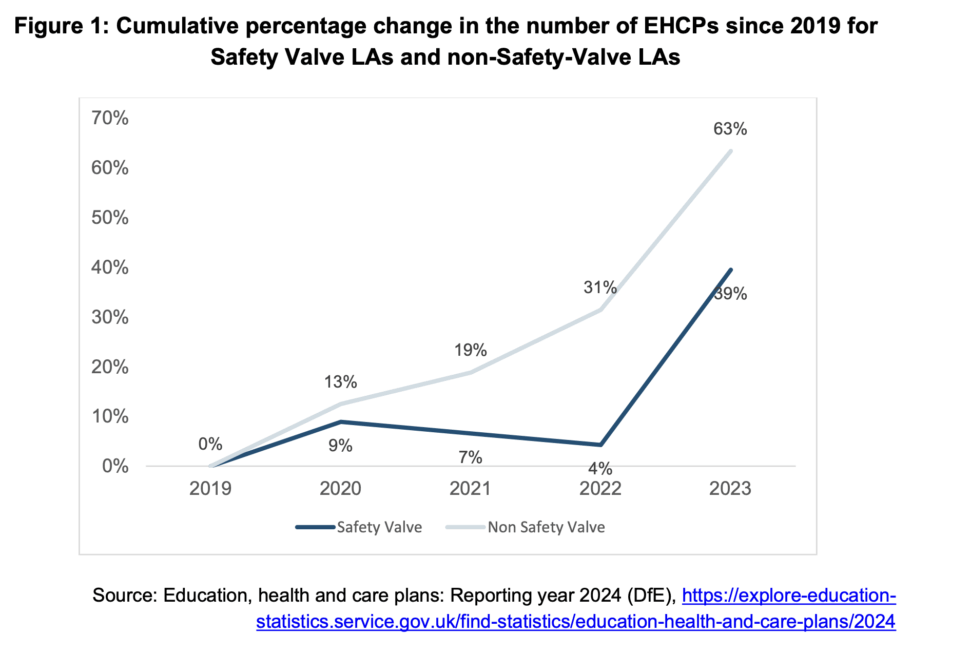Government intervention over ballooning SEND deficits has put families and local authorities in “direct conflict”, a review has found, with fewer new education, health and care plans issued in areas on the controversial ‘safety valve’ scheme.
Research commissioned by the Department for Education on the safety valve scheme – which promises 38 councils with the biggest deficits in their spending on SEND government bailouts of £1 billion in return of strict cost-cutting measures – was published today.
‘Direct conflict with families’
While families and councils largely agreed the scheme was having a positive impact on children, there emerged a “potential point of tension”.
“What might be necessary for LAs and health services to achieve a degree of financial sustainability within the current system can come into direct conflict with what a family or setting sees as necessary for a young person to access support”, the report said.
This creates a risk in “both parties seeing each other as a blockage and blame ensues”, the report said.
Researchers from Isos Partnership interviewed stakeholders from ten councils on the safety valve scheme, including council officers, health services, parents and school leaders.

Parents and families recognised their councils’ financial issues, but said it was not their fault.
One said “bankruptcy is not our problem – it’s not our fault…yet we are made to feel responsible for demanding the services our children need”.
One LA leader said the scheme could be interpreted by parents as a “red flag” because it “suggests it may reduce support for an individual for those who are already suspicious”.
Fewer EHCPs issued in safety valve areas
The government has always insisted that councils on the safety valve scheme do not have targets to reduce the number of EHCPs.
But the study found safety valve councils had a 39 per cent growth in EHCPs issued between 2019 and 2023, compared to a 63 per cent growth in non-safety valve councils.

“This may explain the perception of some parents and setting leaders that, since the introduction of a safety valve agreement in a local area, it has become harder to get an EHCP,” the report added.
Placements at independent or specialist schools in safety-valve areas have also been in decline (falling from 3.8 per cent in 2019, to 2.4 per cent in 2023) compared to a “relatively static rate” in other authorities.
A minority of school leaders, parents and carers considered the scheme had a direct negative impact on children by “making it more difficult to access support … [as] agreements had coincided with more stringent decision-making relating to statutory assessments and EHCPs”.

Leaders acknowledged the safety valve had come to be seen as a programme that “required cutting costs and reducing support” in local communities.
Some suggested it would have been helpful for a “clearer and more positive national narrative” from the DfE on the aims of the scheme. Without this, some LAs reported to have strained relationships with families.
‘Breathing space’ for councils
LA leaders said the scheme had provided much-needed financial “breathing space”, allowing greater focus and sharper planning on improving services.
But some councils said both the quantity and pace of reform had been “greater than the system’s capacity to deal with change”.
School leaders said the safety valve had “fostered a greater collective understanding” on the local SEND system, new provision and better targeted support.
But council leaders argued that the system they were trying to address were “local manifestations of national challenges”, with the safety valve acting as a “sticking plaster” before more fundamental reform took place.
The councils that took part in the study were Barnsley, Croydon, Darlington, Hammersmith and Fulham, Kent, Kirklees, Salford, Surrey, Torbay, and York.

Labour has pledged to reform a system it has described as “on its knees”, with a white paper due to be published in October.
Ministers want to build greater inclusion in England’s mainstream schools and are considering a shake-up of the EHCP system.
The safety valve scheme has since stopped taking new entrants.
The report set out six reform recommendations. These were to tackle disincentives to inclusive practice, strengthen targeted support services and enable local areas to create and shape state-funded specialist provision.
Other recommendations were to align regulation and funding of state placements with the independent sector, strengthen partnership responsibilities between LAs, health services and education settings and more clarity over the future of high needs blocks.








Your thoughts